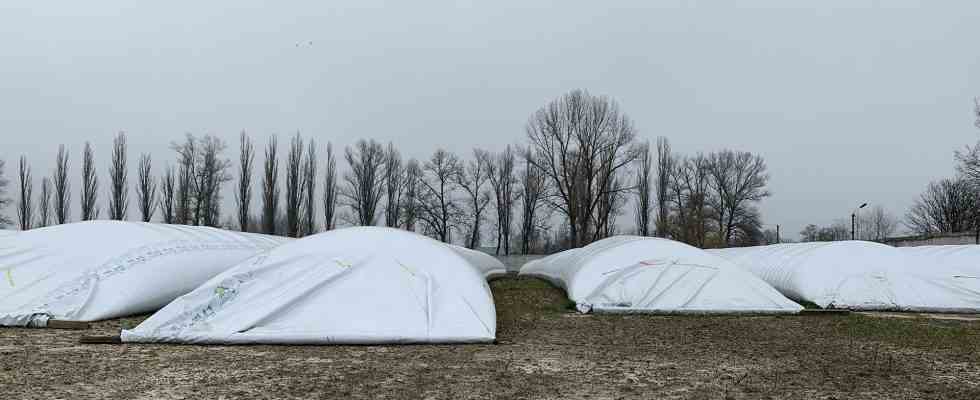report
Status: 03/18/2023 11:30 a.m
The German company Ufik-Agro grows wheat and rye, among other crops, in the Ukraine. The warehouses are increasingly full – the farm is hoping for an extension of the grain agreement.
Dietrich Treis walks through the large courtyard of Ufik-Agro in Koschy, about an hour’s drive east of Kiev. Welding is done because the large tractors, harvesters and combine harvesters have to stay in good shape, according to the managing director.
The German company cultivates around 4500 hectares in the surrounding fields. Sunflowers are sold in Ukraine, but corn, rapeseed, rye and wheat go through traders to customers abroad, as far away as China. The country is a major buyer of Ukrainian grain.
Managing Director Dietrich Treis is worried because there are still thousands of tons of grain in his company’s warehouses.
Image: ARD/Andrea Beer
Russia’s invasion causes overcrowded camps
Up to 22,000 tons can be stored in the silos and halls of the farm, says warehouse manager Natalyja Ivanovna and sighs. The war started in 2014, but the major Russian invasion changed a lot.
You can no longer use the entire area of the fields because of the mines: “And because of the curfew, we only work between five and eleven in the evening. That’s just not enough in agriculture. Normally our warehouses are empty at this time of year, but we have 4,000 tons of corn, 1,000 tons of sunflowers and 2,800 tons of wheat, and that’s too much.”
Around 4000 tons of grain are waiting to be transported away
Together with Treis she is in the warehouse with the corn. The grain export agreement is important, emphasizes the managing director. He estimates that many farms in Ukraine still have a lot of grain in stock.
At Ufik-Agro, too, silos, halls or special plastic hoses are not empty. The grain in the warehouse has actually already been sold, but is not being accepted at the Black Sea ports at the moment because no ships are coming to clear the warehouses there, Ties said. The delivery period for the grain sold had actually already expired. “Fortunately, we have already marketed most of our grain, but there are still around 4,000 tons that are actually just waiting to be transported to the port,” says the managing director.
The German company rents trucks or train wagons for this purpose. Advantage here: rail loads are safely accepted at the port in Odessa or Chornomorsk. Unlike trucks, which often have to wait. Ships are also damming up at the moment. In February of this year alone, only around half of the almost 300 planned checks were carried out, according to the responsible infrastructure minister, Oleksandr Kubrakow. According to the allegation from Kiev, Russia is systematically carrying out agreed ship inspections in the Bosphorus slowly.
Ukrainian agricultural exports are doing surprisingly well
Treis also thinks this is possible. At the beginning of the grain agreement, the Russian side apparently did not expect that Ukraine would use the grain corridor through the Black Sea towards the Bosporus so quickly and efficiently, the 58-year-old suspects. “After Russia noticed that Ukraine was sending out significant amounts, plus what is now going out overland, they started delaying.”
Indeed, Ukrainian agricultural exports via the three Black Sea ports through the grain corridor have been doing surprisingly well so far. Difficult logistics and high transport costs push grain prices in Ukraine well below world market prices. Moscow only wants to extend the grain agreement by 60 days and is also calling for fewer sanctions – for example when exporting ammonia fertilizer through a pipeline in Ukraine that is currently closed. Ukraine wants at least 120 days and no relief from sanctions.
The assistant to Presidential Advisor Andriy Yermak, Daria Sariwna, said that Russia is doing everything to ensure that the grain agreement does not work and is not extended: “Why is it clear: Russia wants to drive Ukraine out of the world market as a competitor and damage the Ukrainian economy. In addition, it is Part of the information war. Russia wants to convey that the countries most in need are suffering because of the war in Ukraine.”
Some fields cannot be used because of mines and bullet holes.
Image: ARD Ukraine/Andrea Beer
The company wants to convey stability to its employees
Martial law prevails in Ukraine and the army has the right to confiscate trucks or machines. Tries handed over some trucks at the beginning of the great Russian invasion and donated grain to the army and the people in the area.
According to Treis, the company wants to remain in the country, also to invest and thus provide at least a certain degree of stability for the around 80 employees during the difficult period of the Russian attack.
However, some of the men could be drafted. That could affect more than 20 conscripts, says Treis – especially tractor drivers, who cannot be replaced with today’s technology in the profession. “If a larger part, especially the good ones, were drafted, we would have considerable problems. These are specialists who cannot simply be replaced.”
A German agricultural company in the Ukraine
Andrea Beer, ARD Kiev, March 18, 2023 9:29 a.m

